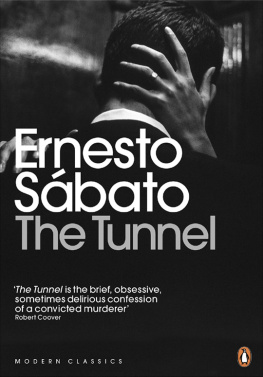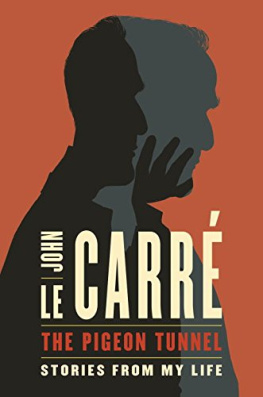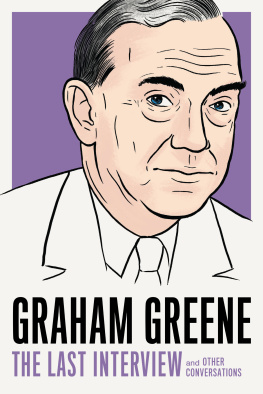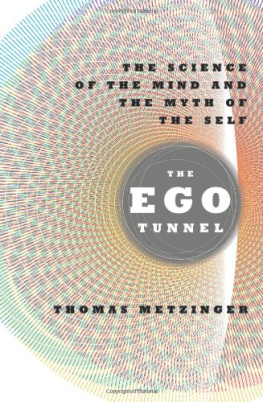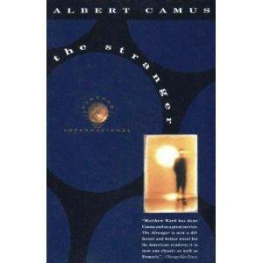PENGUIN MODERN CLASSICS
The Tunnel
Ernesto Sbato was born on 24 June 1911 in Rojas, Argentina. He obtained his PhD in Physics from the Universidad Nacional de La Plata, but in 1945 he abandoned his career in science to dedicate himself exclusively to writing and painting. In 1948, after being rejected by several editors in Buenos Aires, Sbato published El Tnel in Frances Sur magazine, where it was read by Albert Camus, who commissioned the novel for Gallimard. Thomas Mann and Graham Greene quickly announced their admiration for the novel. It has been further translated into more than ten languages and has become an international bestseller. Sbatos other novels include On Heroes and Tombs (1961) and The Angel of Darkness (1974).
Colm Tibn was born in Ireland in 1955. He is the author of six novels, including The Blackwater Lightship and The Master, both of which were shortlisted for the Booker Prize and Brooklyn, which won the Costa Novel Award. He is also the author of two short story collections, Mothers and Sons and The Empty Family.
I
It should be sufficient to say that I am Juan Pablo Castel, the painter who killed Mara Iribarne. I imagine that the trial is still in everyones mind and that no further information about myself is necessary.
Granted, it is true that the devil himself cannot predict what people will remember, or why they remember it. I for one have never believed there is such a thing as a collective memory which may be one way humans protect themselves. The phrase the good old days does not mean that bad things happened less frequently in the past, only fortunately that people simply forget they happened. Obviously that view is not universally accepted. I, for example, would characterize myself as a person who prefers to remember the bad things. I might even argue for the past as the bad old days, if it were not for the fact I consider the present as horrible as the past. I remember so many catastrophes, so many cynical and cruel faces, so many inhumane actions, that for me memory is a glaring light illuminating a sordid museum of shame. How often have I sat for hours in some dark corner of my studio, driven to despair by reading an account of some crime in the newspaper. Even so, it is not always in accounts of crimes that we find the most reprehensible acts of humankind; to a degree, criminals are the most decent and least offensive people among us. I do not make this statement because I myself killed another human being; it is my profound and honest conviction. Is a certain individual a menace to society? Then eliminate him and let that be an end to it. That is what I could call a good deed. Think how much worse it would be for society if that person were allowed to continue distilling his poison; think how pointless it would be if instead of eliminating him you attempted to forestall him by means of anonymous letters, or slander, or other loathsome measures. As for myself, I frankly confess that I now regret not having used my time to better advantage when I was a free man, that is, for not having done away with six or seven individuals I could name.
It is a terrible world; that truism demands no demonstration. Nonetheless, I will offer a single example as proof. Some years ago I read that in one of the concentration camps when a former pianist complained of hunger he was forced to eat a rat a live rat.
However, that is not the subject I want to discuss now. If the opportunity arises, I will have more to say on the subject of the rat.
II
As I was saying, my name is Juan Pablo Castel. You may wonder what has motivated me to write this account of my crime (I may not have told you that I am going to relate all those details) and, especially, why I want to publish it. I know the human soul well enough to predict that some of you will believe it is from vanity. Think what you want, I dont give a damn. It has been a long time since I cared a fig for mens opinions or their justice. Go ahead, then, believe if you wish that I am publishing this story out of vanity. After all, I am made of flesh and blood and hair and fingernails like any other man, and I would consider it unrealistic for anyone to expect special qualities of me particularly of me. There are times when a person feels he is a superman, until he realizes that he, too, is low, and vile, and treacherous. I do not need to comment on vanity. As far as I know, no human is devoid of this formidable motivation for Human Progress. People make me laugh when they talk about the modesty of an Einstein, or someone of his kind. My answer to them is that it is easy to be modest when you are famous. That is, appear to be modest. Even when you think a person hasnt the slightest trace of vanity, suddenly you discover it in its most subtle form: the vanity of modesty. How often we see that kind of person. Even a man like Christ whether real or symbolic a being for whom I have always felt, indeed, still do, the deepest reverence, spoke words that were motivated by vanity or at least by arrogance. And what can you say of a Leon Bloy, who defended himself against the accusation of arrogance by arguing he had spent a lifetime serving people who did not deserve to lick his boots. Vanity is found in the most unlikely places: in combination with kindness, and selflessness, and generosity. When I was a boy I used to despair at the idea that my mother would die one day (as you grow older you learn that death is not only bearable but even comforting). I could not imagine that she might have faults. Now that she is dead, I can say that she was as good as a human being can ever be. But I remember in her last years, when I was a grown man, how at first it pained me to discover a very subtle trace of vanity or pride underlying her kindness and generosity. Something much more illustrative happened to me personally when she had an operation for cancer. In order to arrive in time I had to travel two full days without sleeping. When I reached her bedside, a tender smile lighted her face as she murmured a few words of sympathy (imagine, she was sympathizing with my fatigue!). And in the obscure depths of my being I felt the stirring of vain pride for having come so promptly. I confess this secret so that you will see I am sincere when I say that I am no better than any other man.
No, it is not because of vanity that I am telling this story. I might be willing to concede some degree of pride or arrogance. But why do I have this mania to explain everything that happens? When I began this account I had determined not to offer explanations of any kind. I wanted to tell the story of my crime: that and nothing more. Anyone who was not interested did not have to read it. Although I would be very suspicious of that person, because it is precisely people who always demand explanations who are the most curious, and I am sure that none of them would miss the chance to read to the very end the story of a crime.
I could withhold the reasons that motivated me to write these confessional pages, but since I have no desire to be considered an eccentric, I will tell the truth, which is simple enough anyway: I thought that what I wrote might be read by a great many people now that I am a celebrity, and although I do not have many illusions about humanity in general and the readers of these pages in particular, I am animated by the faint hope that someone will understand me even if it is only one person.
Why, someone will surely ask, such a faint hope if the book will be read by so many people? This is typical of the kinds of questions I consider absolutely pointless; nevertheless, I must be prepared for them, because people constantly ask pointless questions, questions the most superficial analysis reveals to be unnecessary. I could speak until I dropped, yelling at the top of my lungs before an assembly of a hundred thousand Russians: not one would understand me. Do you see what I am saying?
Next page
